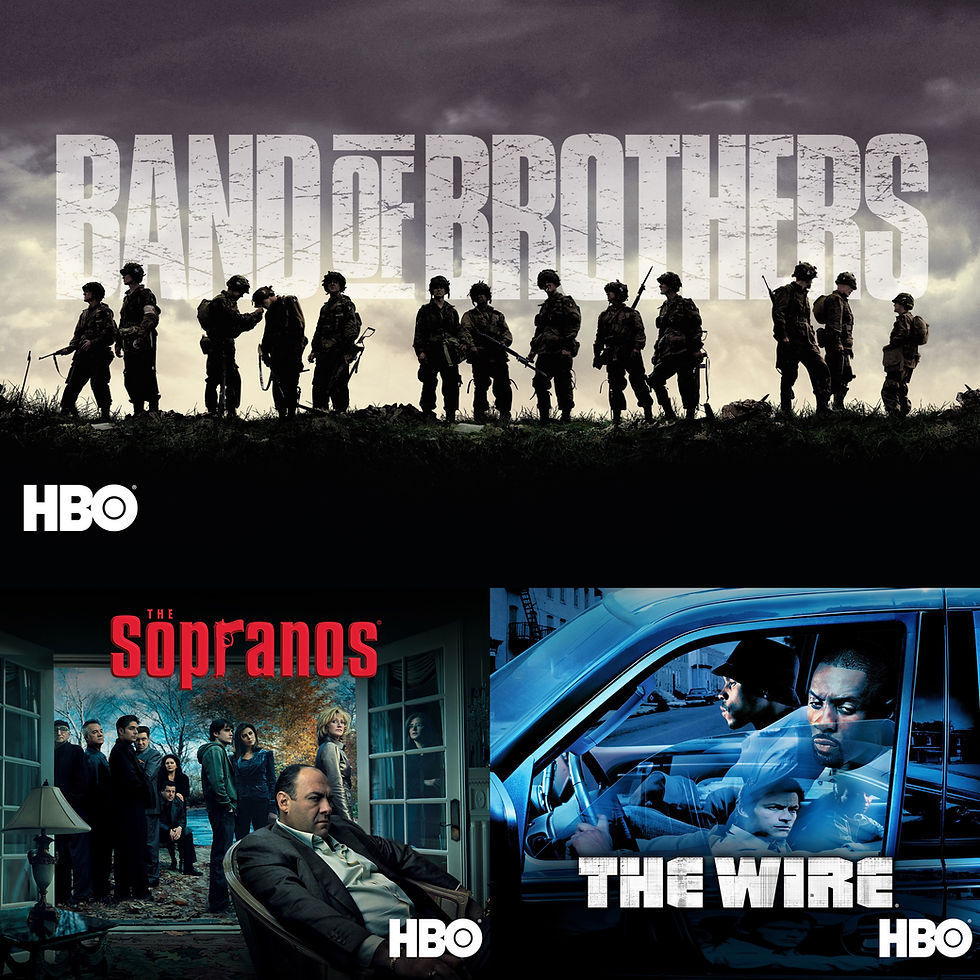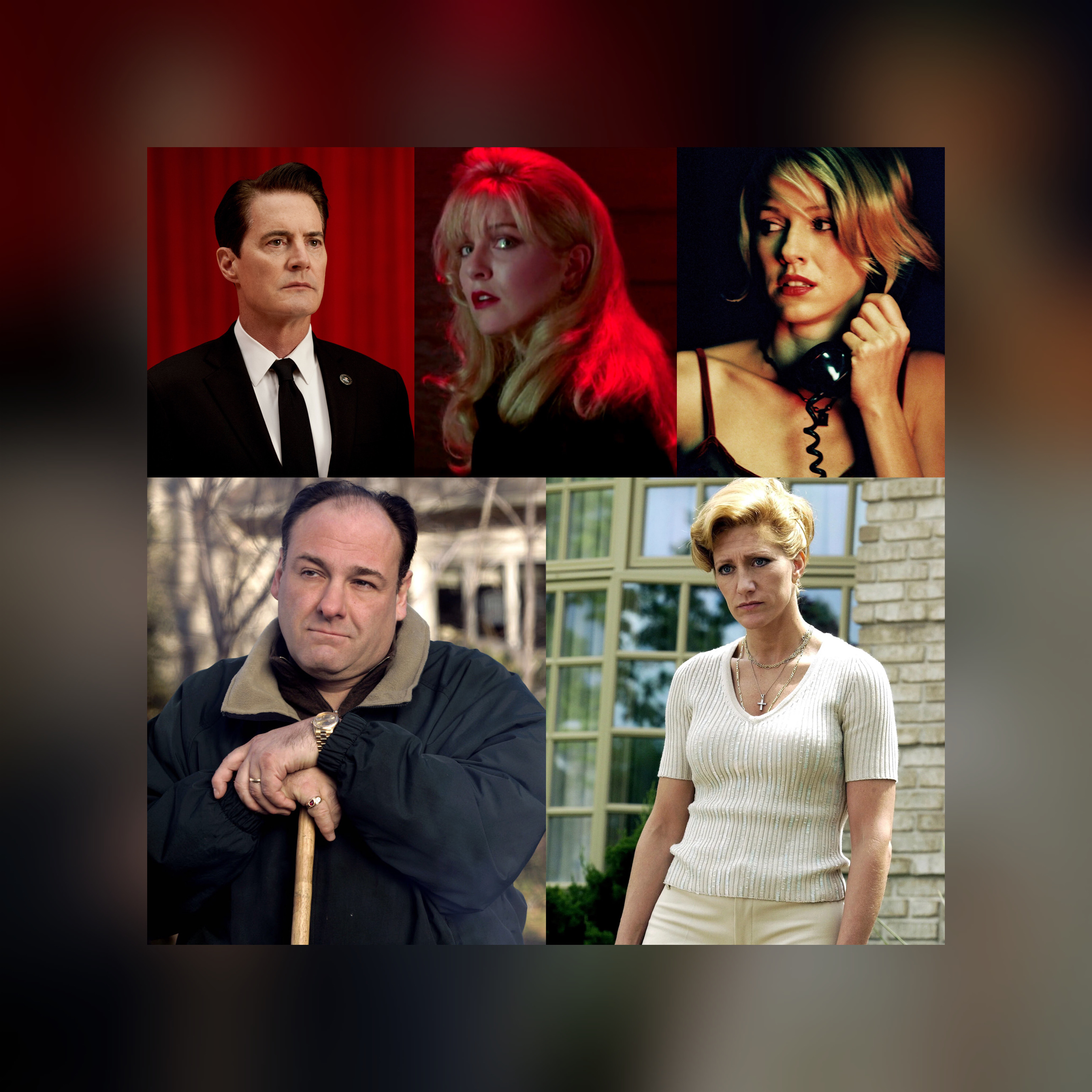The Sopranos, Band of Brothers & The Wire: How HBO Changed Television Forever
- Aran Donnelly
- Oct 6, 2022
- 7 min read
Updated: Feb 12, 2023

Prior to 1999 and the ongoing early 2000’s, television was always seen as a “lesser” art form to cinema. Though previous shows like Twin Peaks showed a cinematic potential for television as a serious artistic enterprise, TV’s potential for cinematic storytelling was still in its infancy. From the years 1999-2002 however, prestige cable network HBO produced three legendary, critically acclaimed and groundbreaking series; The Sopranos (1999-2007), Band of Brothers (2001), and The Wire (2002-2008), which would both change the landscape of television forever and kickstart the Golden Age of TV as we know it today.
The Sopranos first aired on HBO in 1999, before finishing in 2007. It follows New Jersey mob boss Tony Soprano (played by the late great James Gandolfini) as he undergoes psychiatric therapy to deal with his ever-growing depression and anxiety as he tries to deal with balancing his domestic family life with his criminal mob life. The show, despite ostensibly being a Mafia drama, is in reality, so much more than that. It is a meditation on mental health, the modern human condition, existential dread, depression, urban/societal decay and the hollow emptiness of the American Dream.
Tony Soprano is by far one of the most fascinating and complex characters in the history of fiction. He is a character the audience can both simultaneously relate to and be repulsed by. Like me, I find him in some ways relatable, as he too is fond of film, history (particularly WWII history), and struggles with mental health problems much like myself. However, I am also repulsed by him as he is a racist who frequently disparages ethnic minorities, a misogynist who treats women like objects, and a violent, brutal gangster who preys on honest hard-working folks and takes what he believes is his. James Gandolfini’s ingenious portrayal of the character makes Tony both relatable and repugnant at the same time, showing the character’s two sides: the loving family man who is particularly protective and affectionate towards his teenage daughter Meadow and who pets animals, and the vicious, cold-blooded gangster who kills and brutalises those who get in his way. It is a true testament to the writing and Gandolfini’s performance that Tony is as complex, fascinating and three-dimensional as he is.
The Sopranos also vividly depicts America as an ageing empire in rapid decay. The effects of conservative neoliberalism and later President George W. Bush’s War on Terror show decrepit poverty in New Jersey’s inner cities, and the alienating effects that neoliberalism and Bush’s surveillance state have perpetuated onto the American psyche and American cities. The decrepit cities and urban poverty as showcased in The Sopranos would later be expanded upon in The Wire, which I’ll get to later. Overall, The Sopranos’ generous budget, cinematic camerawork, and fantastic acting and writing helped massively elevate TV to an equal, if not greater status, as film when it comes to artistic storytelling.
HBO’s landmark WWII epic miniseries, Band of Brothers, created and produced by film industry legends Steven Spielberg and Tom Hanks, helped continue, if not expand, on The Sopranos’ cinematic elevation of prestige television. Produced on a whopping budget of $125 million across ten episodes ($12.5 million per episode), Band of Brothers was produced on the same big budget and cinematic grandeur as a Hollywood World War II epic. The groundbreaking miniseries follows the story of Easy Company, 506th Regiment of the 101st Airborne Division, U.S. Army, told primarily through the perspectives of best friends Richard D. Winters (played by Damian Lewis) and Lewis Nixon (played by Ron Livingston). Based on interviews with survivors of Easy Company, as well as soldiers' journals and letters, this 10-part series chronicles the experiences of these young men who knew extraordinary bravery and extraordinary fear.
Band of Brothers was an absolute landmark in television history. It brought the scope of history and the horrors of World War II to life on the small screen as never ever seen before on television. The large-scale, big budget battles, brutal violence, and emphasis of the toll WWII took on its soldiers felt far more like something out of a Hollywood blockbuster than a television miniseries. The friendship and comradely between Winters, Nixon and the other members of Easy Company, was also fleshed out and expanded upon in ways a film cannot deliver, making us grow that much more attached to them due to the longer luxury granted to them by the medium of television. The epic, cinematic scope of Band of Brothers, along with The Sopranos, helped completely obliterate the barriers between the big and small screens and their previously different potentials for large-scale cinematic storytelling.
The show’s most famous and upsetting episode, “Why We Fight” shows the horrors that US soldiers discover when liberating the prisoners of a Nazi concentration camp. The burnt corpses, emaciated bodies, and sheer terror on the Jewish prisoners’ faces as they tearfully hug their liberators brings unprecedented emotion as the full horrors of Nazi Germany’s evil regime are shown right before our very eyes. Previously, the soldiers, particularly Nixon, failed to see the point in why they were fighting such a long, costly and brutal war. But upon seeing the sheer inhumanity and suffering brought onto so many innocent people, Winters, Nixon and the rest of Easy Company are reminded once again “Why We Fight”. This shows that despite the millions of lives lost and civilisations destroyed, World War II was a necessary war that had to be fought in order to stop Hitler’s evil regime from eradicating all races they saw as “inferior” and from massacring their way across Europe. It is by far the most emotional episode of the series, and quite possibly, the most emotional episode in the history of mainstream television. Band of Brothers viscerally brought history to life as never seen before on television, and has since paved the way for the era of large-scale epic cinematic storytelling on our TV screens which still continues to this very day.
Finally, The Wire, created by David Simon, is a sprawling look at urban poverty and societal decay in the impoverished American city of Baltimore, Maryland; examining the socio-economic conditions of poverty which leads young black men into a life of crime, while also tackling government corruption and police brutality as part of Simon’s scathing critique of institutional corruption. The series follows a variety of characters, most notably police detective Jimmy McNulty (Dominic West), ambitious drug dealer Stringer Bell (Idris Elba), and fan-favourite Omar Little (the late, great Michael K. Williams), the latter being a modern-day Robin Hood archetype.
Like its predecessors, The Sopranos and Band of Brothers before it, The Wire’s long-term and continuous cinematic approach to storytelling helped revolutionise television and kickstart the Golden Age of prestige television as we know and love it today. The Wire is quite possibly the most political of the three series. The show’s bleak depiction of the urban housing projects where young black men are all but forced into a life of crime to earn a living is at the core of the show. The bleak and miserable conditions that many of the show’s impoverished black characters live in is heavily juxtaposed with the comfortable and modest lifestyles of the mostly white Baltimore Police Force and City Council. Characters like the iconic Omar Little are depicted in an extremely sympathetic manner, choosing a life of crime out of desperation to climb out of the cycle of poverty brought onto them by white institutions and corruption. Omar’s depiction as a gay black man who stalls fear into the hearts of Baltimore’s criminal underworld was also revolutionary for the time, depicting a complex black LGBT character with nuance and complexities never previously seen before on television. Omar Little is rightly regarded, alongside Tony Soprano and Walter White, as among the greatest and most iconic characters to ever grace television screens. Omar is in many ways, the heart and soul of The Wire.
The Wire is also a series that rings eerily prescient in the current era of police brutality and the Black Lives Matter movement. The show repeatedly depicts both the police and city council as woefully corrupt institutions who continuously subjugate black men of lower social classes than them. Police brutality is shown several times throughout the show, with high-ranking officers such as John Doman’s Major Rawls often using racial slurs when referring to black criminals, while the cops, particularly Domenick Lombardozzi’s Herc, are often showing brutalising and intimidating black suspects. The show also examines institutional corruption, primarily through Aidan Gillen’s corrupt politician Tommy Carcetti, who uses the police to ramp up high-profile arrests, rather than do anything to try curb the perpetual cycle of poverty which causes crime in Baltimore in the first place. The left-wing political views of many of the show’s cast and crew, including creator David Simon, actors Wendell Pierce and the late Michael K. Williams, only serve to reinforce the show’s anti-establishment themes and eery prescience to modern-day American corruption. Creator David Simon even once proclaimed that his show bluntly shows that “the American Dream is dead”, with the show’s depiction of urban poverty and societal decay serving as a chilling precursor to the rise of far-right nationalism among many of America’s Republican politicians today.
The Wire ultimately rings equally relevant, if not more so today, than it did when it first aired. The show’s depiction of urban poverty and the United States as an empire in decay helped serve as a chilling precursor to the rise of Trump and far-right ideologies in the US, with the US public being fed up with the status quo and the way things are. The show’s depiction of urban poverty and the effects it has on black citizens in the projects ultimately demonstrates the institutional corruption which leads young black men into crime. The show’s unflattering depiction of the corrupt and often racist police forces also makes the show an ever-relevant landmark for the current Black Lives Matter era, ringing especially true with much of the show’s left-leaning cast and crew supporting the current BLM movement.
Overall, The Sopranos, Band of Brothers and The Wire, all ultimately demonstrate how HBO changed television forever in the early 2000’s, and why HBO remain at the top of the TV food chain to this very day. With layered and complex characters, higher budgets, cinematic approach to storytelling, and themes ranging from history to war, poverty and corruption, mental health and urban decay, these three shows ultimately served as the benchmark for modern television, and ultimately remain to this day, my three favourite television shows and works of media ever produced.
By @tvnerdaran
RATE THIS ESSAY
6
5
4
3











Comments